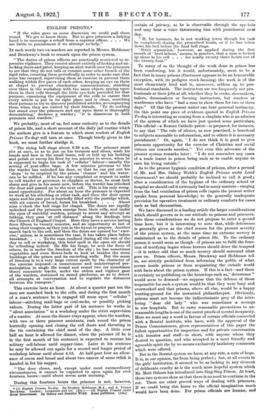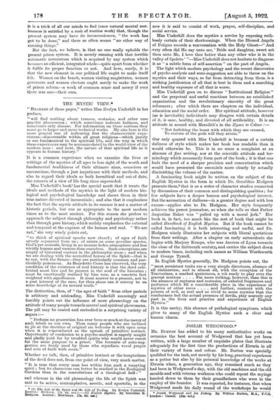ENGLISH PRISONS.*
• (1) English Prisons To-day. By Stephen Hobhouse, M.A., and A. Fenner Brockway. London; Longmans and Co. [258.)—(2) English Prisons under Local Geeernosenr. By Sidney and Beatrice Webb. Same publisher. [158.J
"If the rules gave us some discretion we could pull them round. We get to know them. But to give prisoners a helping hand is to encourage a rebuff from a superior officer. . . . We are liable to punishment if we attempt tothelp."
IN such words two ex-warders are reported in Messrs. Hobhouse • and Brock-way's book to remark upon the prison system.
"The duties of prison officers are practically restricted to re- pressive vigilance. They consist almost entirely of locking and un- locking doors and gates, keeping an alert watch over the prisoners to see that they do not talk or commit some other breach of the rigid rules, counting them periodically in order to make sure that none has escaped, supervising them at exercise to prevent them walking within five paces of each other, keeping an eye on them at chapel to prevent clandestine communication, standing over them in the workshop with the same object, spying upon them in their cells through the little eye-hole provided for that purpose, examining the equipment of the cells to ensure that every article is put in its right place and is clean, searching their persons to try to discover prohibited articles, accompanying them when they are visited by their friends. 'To do nothing but stand over the prisoners and spy upon them is thoroughly demoralising,' declares a warder ; it is disastrous to both prisoners and warders.' "
We probably, most of us, feel some curiosity as to the details of prison life, and a short account of the daily jail routine which the authors give is a feature to which most readers of English Prisons To-day" will turn at once. Though briefly given in the book, we must further abridge it.
"The rising bell rings about 6.30 a.m. The prisoner must rise at once, so as to put on his trousers and shoes, wash his hands and face in the small basin, roll or fold up his bedding and polish or sweep his floor by ten minutes to seven, when he is supposed to begin his task of ` cellular ' labour—usually the sewing of post-office bags. A few minutes previous to this the warder has unlocked his door, so that he can put out his ' slops ' to be emptied by the prison ' cleaner ' and his water- can to be refilled. If he has any complaint or request to make to cell warder or governor, to chaplain or doctor, he must look sharp and give in his name now, before the warder has relocked the doer and passed on to the next cell. This is his only recog- nised opportunity. For about an hour the prisoner is expected to work at his stitching or other task, and then the door opens again and his pint pot is hurriedly filled with the porridge which, with six ounces of bread, forms his breakfast. . . . About nine o'clock the bell rings for chapel. The doors are rapidly unlocked and the prisoners emerge from their cells, and under the eyes of watchful warders, prompt to arrest any attempt at talking, they pass 'at cell distance along the landings into the Church of England Chapel. Here they have a service lasting from fifteen to twenty minutes, and an opportunity at last of using their tongues, as they join in the hymn or prayers. Another march back to the cell, and then the doors are opened for exer- cise,' unless, as is sometimes the case, it has taken place before breakfast. . . . To the man confined during all the rest of the day to cell or workshop, this brief spell in the open air should be refreshing indeed. He fills his lungs, he sees the faces of others, he is under the freedom of the sky ; he has sometimes vegetables and even flower-beds to look at besides the stern buildings of the prison and its encircling walls. But the sense of freedom is to a very large extent spoilt by the character of the exercise imposed—a monotonous and uninterrupted per- ambulation in single file round and round two (or sometimes three) concentric tracks, under the orders and vigilant gaze of the warders, stationed on raised platforms, so as to detect all attempts at conversation and to regulate the distances between the trampers."
This exercise lasts an hour. At about a quarter past ten the men are marched back to the cells, and during the first month of a man's sentence he is engaged till noon upon " cellular " labour—stitching mail-bags or coal-sacks, or possibly picking oakum. During the latter part of his sentence he works in "silent association" in a workshop under the strict supervision of a warder. At noon the dinner-trays appear, when the warders, with two or three prisoner assistants, rush round the prison hurriedly opening and closing the cell doors and thrusting in the tin containing the chief meal of the day. A little over half an hour is allowed for dinner, when the prisoner (if he is in the first month of his sentence) is expected to resume his solitary cell-labour until supper-time. Later in his sentence he may be allowed out again for a second and longer period of workshop labour until about 4.15. At half-past four an allow- ance of cocoa and bread and about two ounces of some relish is handed in for his supper.
"The door closes, and, except under most extraordinary circumstances, it cannot be expected to open again for over fourteen hours—until about seven next morning."
During this fourteen hours the prisoner is not, however,
certain of privacy, as he is observable through the spy-hole and may hear a voice threatening him with punishment nexst day.
"If, for instance, he is not working (even though his task be completed) during the prescribed hours, or if he has taken down his bed before the final bell rings.
'Strict separation,' however, as applied during the first month of 'hard labour,' means, in practice, that a man is locked up alone in his cell . . . for nearly twenty-three hours out of the twenty-four."
To many of us the thought of the work done in prison 'hag been comforting, but it would, unfortunately, seem to be a fact that in many prisons (Dartmoor appears to be an honourable exception, with its pedigree stock-farming) the work is of the most elementary kind and is, moreover, seldom up to pro- fessional standards. The instructors are too frequently not pro- fessionals at their jobs at all, whether they be cooks, shoemakers, tailors, dressmakers or farming instructors, but warders or wardresses who have "had a man to show them for two or three days." Of this the present writer can bear personal testimony. On this point one piece of evidence quoted in English Prisons To-day is interesting as coming from a chaplain who is an admirer of the system of which we have just quoted some particulars, This official—a Roman Catholic priest—is prepared, for instance. to say that "The rule of silence, as now practised, is beneficial to subjects amenable to reformation, and to others it is necessary punishment." Or, again, "I do not think it is good to give prisoners opportunity for the exercise of Christian and social virtues one towards another." Yet even this advocate of the present system remarks later : "X do not remember any cases of a trade learnt in prison being such as to enable anyone to earn his living outside."
As to the present hygienic condition of prisons, after a perusal of Mr. and Mrs. Sidney Webb's English Prisons under Local Government,' we should probably be inclined to call it good ; after a consideration of the hygiene of the ordinary school or hospital we should call it extremely bad in many matters—ranging from the bad ventilation of prison cells (again the present writer speaks from personal knowledge) to the generally inadequate provision for operative treatment or ordinary comforts for cases such as bad rheumatism.
We have discussed in a leading article the larger considerations which should govern us in our attitude to prisons and prisoners. Into these considerations we do not propose to enter a second time here, but it is interesting to note that, while deterrence is generally given as the chief reason for the present severity of the prison system, at the same time an extreme secrecy is maintained as to the details of prison life. To the ordinary person it would seem as though—if prisons are to fulfil the func- tion of terrifying bogies whose horrors should deter the tempted —it is rather odd that so much secrecy should surround what goes on. Prison officers, Messrs. Brockway and Hobhouse tell us, are strictly prohibited from informing the public of what occurs inside prisons or from acquainting the outside world with facts about the prison system. If this is a fact—and there is certainly no publishing on the housetops such as." deterrence" would seem to demand—we suppose that the defence of those responsible for such a system would be that they were busy and overworked and that prisons, above all else, would be a happy hunting-ground for the unwanted philanthropist. Obviously, prisons must not become the indiscriminate prey of the inter- fering "dear old lady" who was sometimes a scourge in war hospitals. But to carry reasonable precautions to an- reasonable lengths is one of the surest proofs of mental incapacity. Here we must say a word in favour of certain officials connected with a Borstal institute, who have, with the approval of the Prison Commissioners, given representatives of this paper the fullest opportunities for inspection and for private conversation with inmates and staff—in short, with anyone whom they desired to question, and who accepted in a most friendly and agreeable spirit the by no means exclusively laudatory comments which were offered.
But in the Borstal system we have, at any rate, a note of hope.
It is, in our opinion, far from being perfect ; but, at all events in the girls' institution, it seemed to be as lacking in any element of deliberate cruelty as is the much more hopeful system which Mr. Mott Osborn has introduced into Sing-Sing Prison. At least, these two systems show us that there is no need to continue in the rut. There are other proved ways of dealing with prisoners. If we could bring this home to the official imagination much would have been done. For prison officials are human, and it is a trick of all our minds to feel (once natural mental rest- lessness is satisfied by a rush of routine work) that, though the present system may have its inconveniences, "the work has got to be done," and there so often seems "no other way of running things."
But the fact, we believe, is that no one really upholds the present prison system. it is merely running with that terrible automatic momentum which is acquired by any system which becomes an efficient, integrated whole—quite apart from whether it fulfils its proper function or not. And here, surely, it is that the new element in our political life ought to make itself felt. Women on the bench, women visiting magistrates, women governors and women electors ought surely to make the work of prison reform—a work of common sense and mercy if ever there was one—their own.



































 Previous page
Previous page